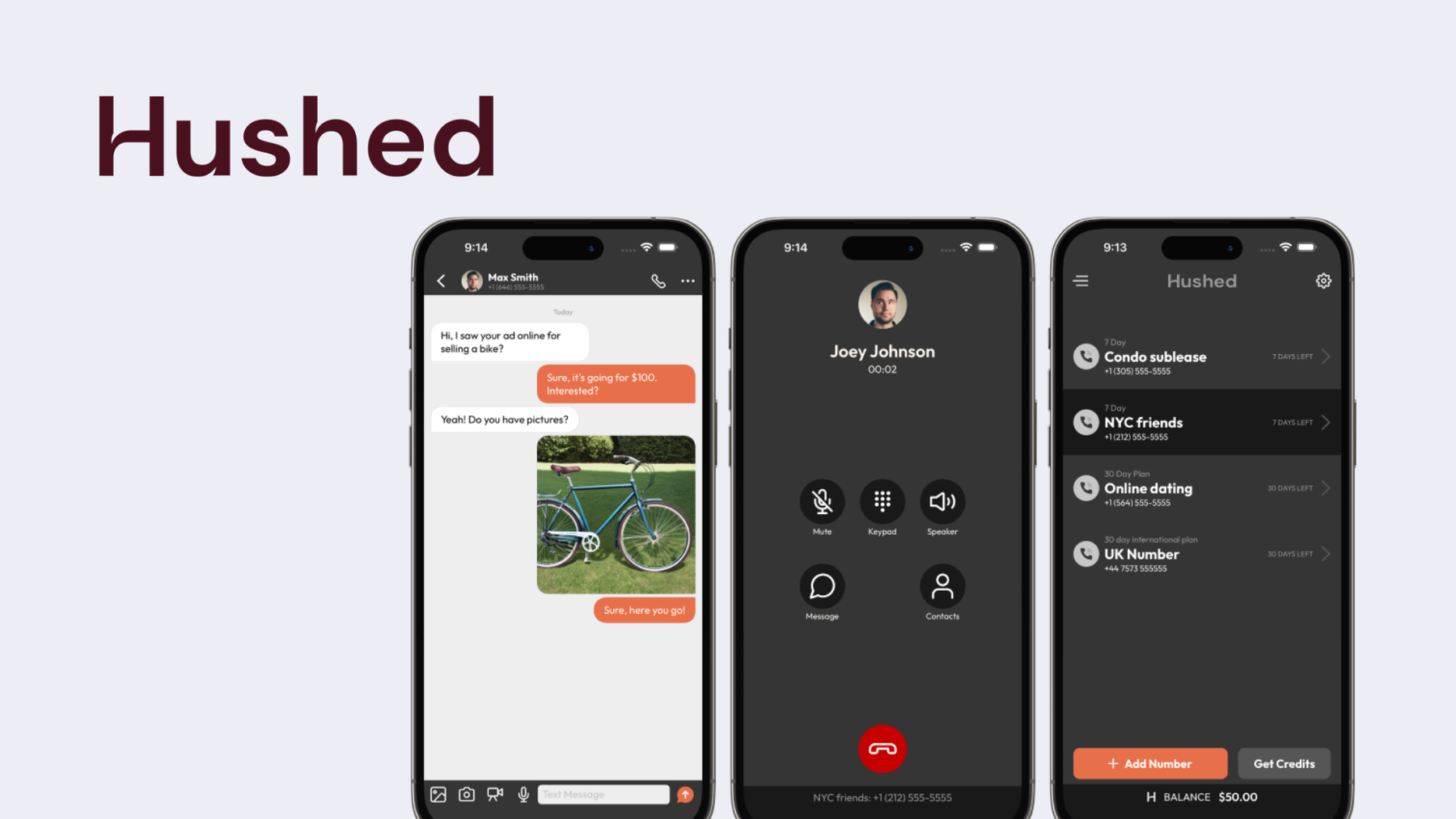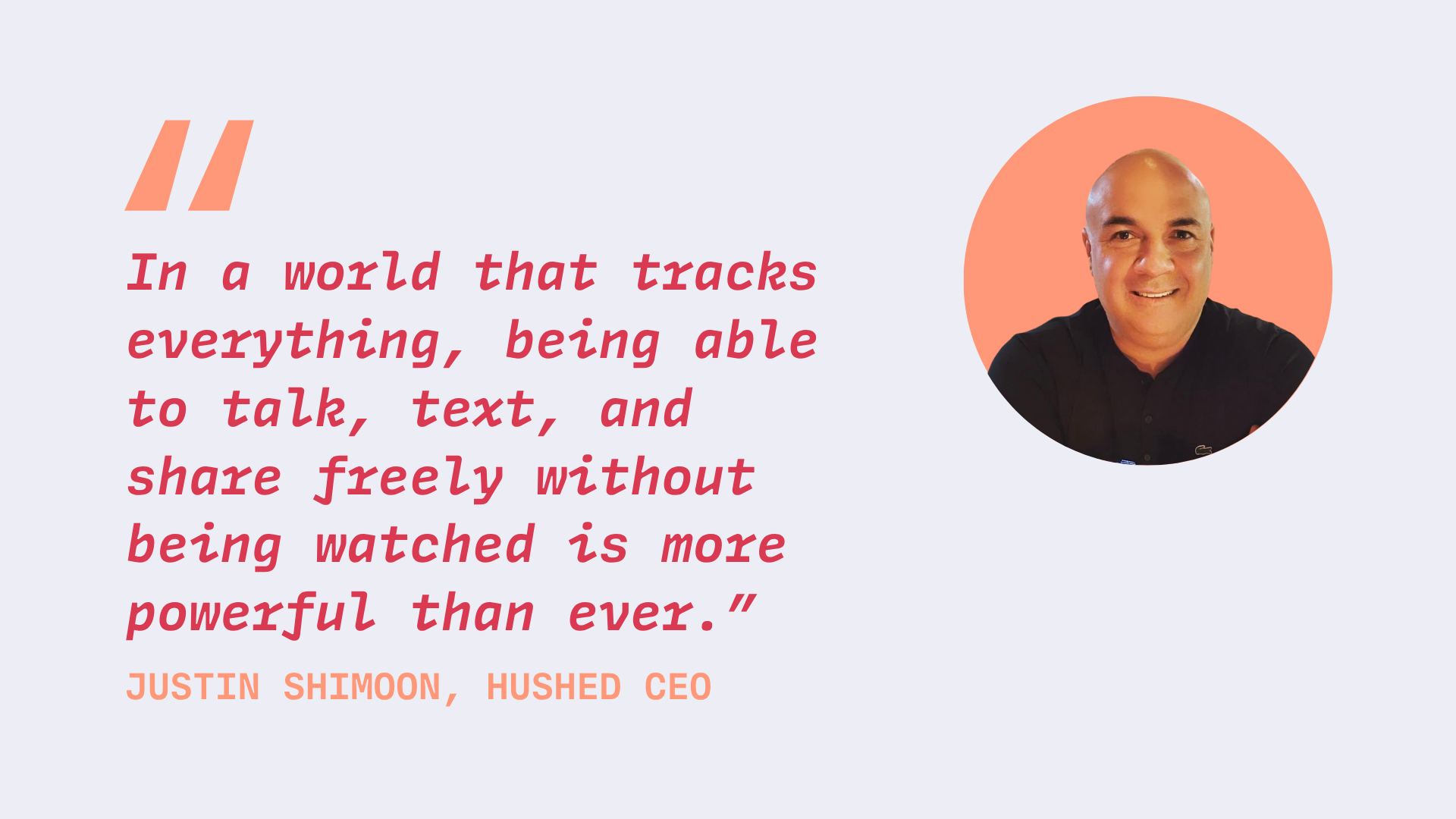Your Email Might Be Private, But What About Your Calls and Texts?
We interviewed Justin Shimoon from Hushed to explore why protecting your phone number matters — and how a private phone number helps you stay anonymous while staying connected.
Question: Why is having a private phone number just as essential to online privacy as using a secure, encrypted email service?
Answer: A private phone number is one of the most overlooked tools in a person’s privacy toolkit. Just like an email, your phone number is tied to almost every online account you have, from social media to banking apps. But unlike email, phone numbers are often used for two-factor authentication and identity verification, which makes them a prime target for phishing, spam, and even SIM-swapping attacks.
When you use your real number everywhere, you’re essentially handing out a piece of your digital identity. It becomes searchable, trackable, and vulnerable. A private or temporary number lets you create separation between your personal life and your online interactions whether that’s dating or selling something online. It’s really about control. Secure email protects your inbox and messages and a private number protects your voice, texts, and identity. We think both are essential in today’s world where our digital footprints are so easy to trace.
Question: What risks do people face when they give out their real number online — and how does a temporary phone number help reduce those risks?
Answer: When you give out your real number online, you’re opening the door to a number of risks, some annoying, some serious. At the most basic level, you’re going to get spam calls and texts. But beyond that, your number can be used to track you, target you with scams, or even attempt account takeovers through SIM swapping. A lot of people don’t realize how many services use your phone number as a key piece of verification. Once someone has that number, they can try to reset passwords, impersonate you, or connect your number to data leaks from past breaches. That’s where a temporary number can be a game changer. It gives you a layer of separation — a buffer — between you and the Internet.
Question: Can you tell us the origin story behind Hushed and the problem it set out to solve for people wanting an anonymous phone number?
Answer: Hushed was born out of a growing need: people wanted a way to communicate without always handing out their personal phone number. Back in 2013, my partner/CTO and I noticed how often people were putting their real number out there — classifieds, dating apps, store loyalty programs — and how that number would just hang around.
We thought, “What if people could have a second number that works just like a real phone line, but one they could turn off or get rid of whenever they wanted?” Something totally separate from their identity and main device. That’s how Hushed came to life as a privacy-first communication tool. The goal honestly was to make it easy for anyone to get a temporary or secondary number without needing a second SIM card or a new phone. Since then, we’ve grown to serving around 25 million users around the world.
Question: What are some of the most common ways people use a private phone number today — beyond just dating or online selling?
Answer: We’ve seen people get really creative with how they use private numbers. Of course our popular use cases for Hushed have been with dating and online marketplaces, but we’ve seen that travelers love using Hushed as well when they’re abroad so they can get a local number in another country without needing to swap SIMs.
We also see second phone numbers used for general privacy-conscious communication for people who want to keep their real number off of things like job applications, political donations, or even signing up for websites that require a phone number.


With Hushed’s phone numbers you can separate your personal life and online transactions, boosting your privacy and security.
Question: There are other apps that offer second numbers. What makes Hushed stand out in the temporary phone number space?
Answer: Hushed stands out for three key reasons: privacy, flexibility, and longevity.
First, privacy is at the heart of everything we do. We don’t run an ad platform and we don’t sell user data, period. A lot of temporary number apps monetize through ads or user tracking, but Hushed was built to offer people a genuinely private communication option.
Second, there’s our flexibility. We’re one of the few apps that lets you choose between short-term plans, or a monthly subscription — so it really works around your needs, whether you need a number for a week or a year.
And finally, Hushed has been around for over a decade, which means we’ve earned trust in this space. We’ve seen a lot of apps come and go, but we’ve stayed focused on delivering a reliable, secure product for people who care about privacy.
Question: Do you think the average person understands the risks of exposing their personal number — or is anonymous phone number use still a niche behavior?
Answer: Honestly, I think we’re in this in-between stage. The average person is becoming more aware of online privacy — they’re using VPNs, encrypted email, and being smarter about what they share — but when it comes to their phone number, there’s still a bit of a blind spot.
For a long time, giving out your number just felt like a part of everyday life. You needed it to sign up, to connect, to verify. But people are starting to realize that a phone number is a very personal identifier. It can be used to track you, spam you, even link you to other data points that can compromise your privacy.
That said, I still think anonymous or private number use feels niche to a lot of people. Maybe even like something only businesses or “techy” folks do. But it shouldn’t be. We think it’s something everyone should consider, even just for convenience — whether it’s dating, travel, selling something online, or signing up for services without giving away your main line.
Question: How do privacy-conscious users pair a temporary phone number from Hushed with tools like Tuta Mail for a more complete anonymous experience?
Answer: Users choose to use Hushed for privacy because they’re often thinking holistically – not just about one layer of protection, but about creating a full ecosystem that keeps their personal info off the grid. So pairing tools like Hushed and Tuta Mail makes sense.
With Hushed, they’re using an anonymous phone number to keep their real number private, then with Tuta, they’re using an encrypted email service that doesn’t track them or collect data.
When you combine the two, you’re protecting two of your most common digital identifiers. It’s also super practical. You can create a Hushed number and a Tuta email just for online transactions, travel, shopping, dating, etc. That way, if one starts getting spammy or you’re just done with it, you can easily move on.
Question: What’s next for Hushed as more people seek out private communication tools in 2025 and beyond?
Answer: We’re seeing a real shift right now with more people waking up to just how exposed their personal information is online, and they’re actively looking for ways to protect their privacy. That’s where Hushed comes in, and we’re really leaning into that movement.
For 2025 and beyond, our focus is on making private communication even more easy and accessible. That means investing in things like better global coverage, smarter privacy features, and partnerships with other privacy-first tools, so people can build their own customized privacy stack.
We’re also exploring expanded use cases beyond just calls and texts — like secure messaging, and ways to safely manage multiple identities online. And of course, we’re staying true to what we’ve always done: no ad platforms, no data harvesting, and no strings attached.
The goal is simple: give people control over their conversations again. Because in a world that tracks everything, being able to talk, text, and share freely without being watched is more powerful than ever.
Install Hushed for free to get started with a second phone number.


